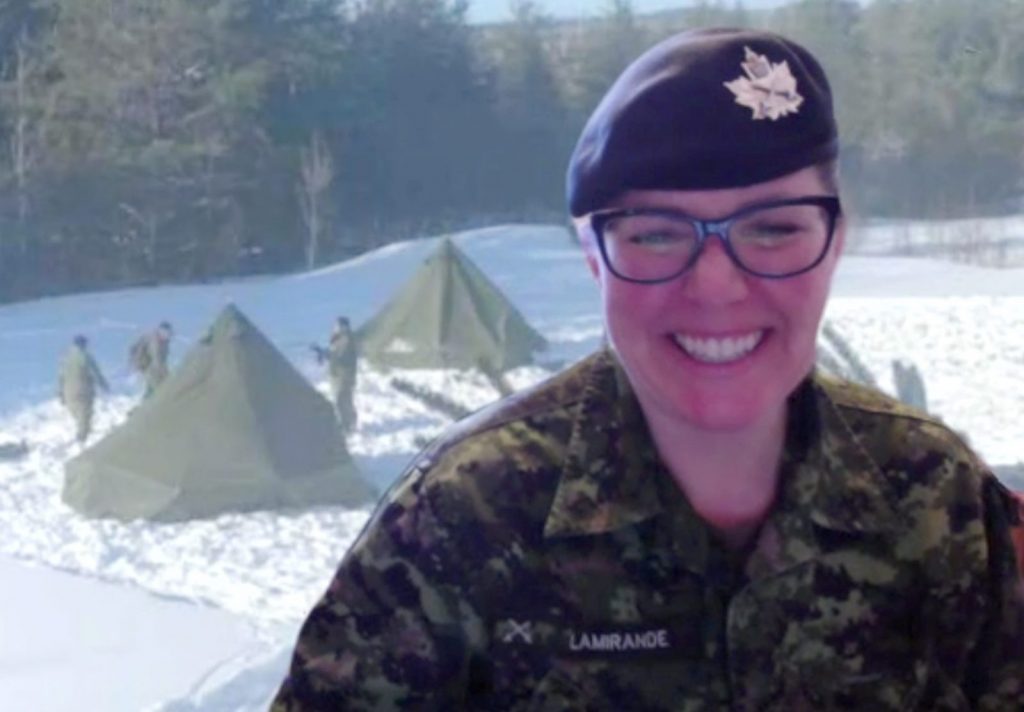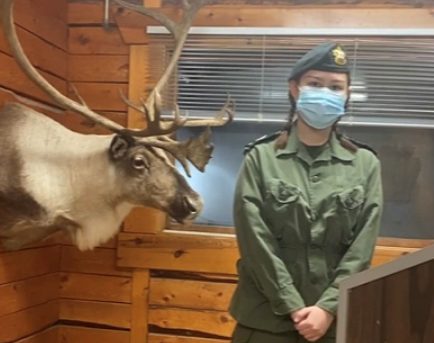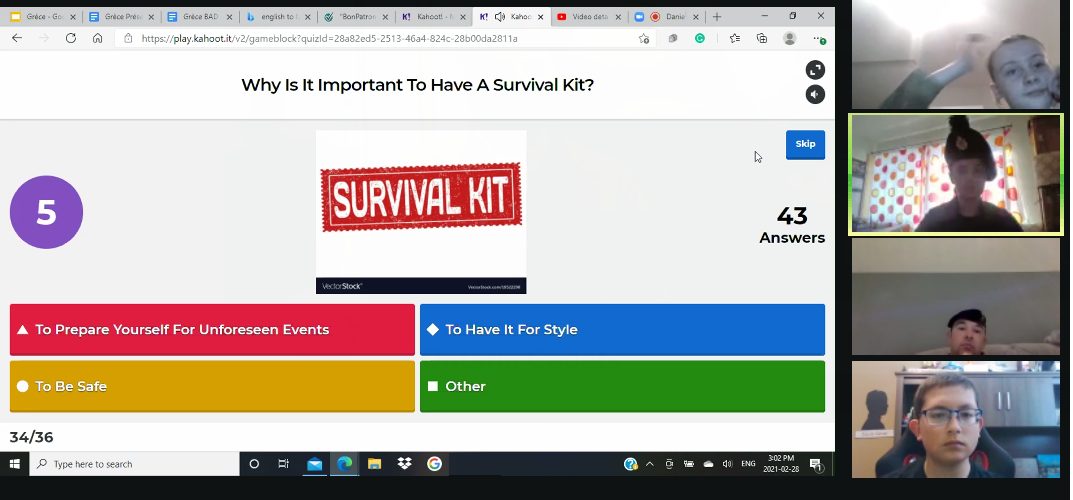by Captain Frédérick Guay
On February 27 and 28, approximately 100 cadets from Canada and Northern Ireland met together virtually for a winter exercise, an international cooperation that benefited both programs on either side of the Atlantic.
Captain Tracy Lamirande, Commanding Officer of the Irish Royal Canadian Army Cadet Corps (RCACC) 2912 in Sudbury, Ontario, was the coordinating officer for the event. She explains how the partnership came about: “In June 2020, I first encountered Captain Gary Miniss of the Army Cadet Force (ACF) of Northern Ireland, as we were preparing for a virtual celebration of D-Day. We kept in touch since, and very naturally the idea of a joint exercise came up.”
In this time of pandemic, the Canadian and United Kingdom Cadet Programs are facing the same challenges. They need to keep training active by reinventing themselves in a virtual environment.

Captain Tracy Lamirande’s goal was to pool the strengths of the Canadian and United Kingdom Cadet Program and to allow exchanges between teenagers during the virtual winter exercise.
In addition to the Sudbury cadets, Canadian cadets from Irish RCACC 2915 in Capreol, Ont., also participated in the exercise. Both corps are affiliated with the Irish Regiment of Canada and are used to working together. Lamirande’s daughter is in the Yukon Territory and involved the RCCAC 2685 cadets from Whitehorse. As for the Northern Ireland cadets, they came from the four corners of the country.
The Canadian and United Kingdom cadet programs have some similarities, including the fact that both countries deal with low winter temperatures. The virtual event featured a busy and informative schedule of shelter construction, protection from the cold, food, first aid kit, etc.
The two cadet programs are also different, and participating cadets had the opportunity to discover the uniqueness of each community. “I am impressed with the tactical training of the cadets in the UK. I enjoyed learning about their traditions and what their uniforms and badges look like,” shared Cadet Master Corporal Averlen Bacchuber of Whitehorse.
The Commanding Officer of the 1st Battalion Northern Ireland ACF, Colonel Adrian Donaldson, said, “An amazing event, which saw lots of Canadian and Northern Irish cadets reach across the Atlantic and establish new friendships, whilst demonstrating the various skills they have developed as cadets. I was impressed by the enthusiasm shown by all and the very high standard of the individual presentations. It was good to see the Irish Regimental traditions being maintained by the Canadian Irish Cadet units.”
This view was shared by Colonel Adam Carlson, Deputy Commanding Officer of the Canadian Cadets and Junior Canadian Rangers: “Joint exercises, even virtual ones, bring out the best in our cadets. We are proud of the long and close collaboration which we have had with the Army Cadets in the United Kingdom.”
Captain Frédérick Guay is the Unit Public Affairs Representative for the Cadets and Junior Canadian Rangers.
Des cadets du Canada et de l’Irlande réunis
par Capitaine Frédérick Guay
Les 27 et 28 février, une centaine de cadets du Canada et de l’Irlande du Nord se sont réunis virtuellement lors d’un exercice hivernal. Une coopération internationale qui a profité aux deux Programmes de chaque côté de l’Atlantique.
Capitaine Tracy Lamirande est l’officier de coordination de l’événement et commandant du Corps de cadets royaux de l’armée (CCRAC) 2912 Irish Sudbury en Ontario. Elle explique comment ce partenariat est né. « En juin 2020, j’ai eu un premier contact avec le Capitaine Gary Miniss de l’Army Cadet Force (ARF) d’Irlande du Nord alors que nous préparions une célébration virtuelle du Jour J. Nous avons gardé contact et très naturellement l’idée d’un exercice conjoint est apparue. »

La cadette Caporal-chef Averlene Bachhuber a eu l’opportunité de présenter Whitehorse aux participants de l’exercice international virtuel.
En ces temps de pandémie, les Programmes des Cadets du Canada et du Royaume-Uni font face aux mêmes défis. Il faut garder l’entraînement actif en se réinventant dans un modèle virtuel.
Au Canada, en plus des cadets de Sudbury, des cadets du CCRAC 2915 Irish Capreol aussi en Ontario participaient à l’exercice. Les deux corps sont affiliés au Irish Regiment of Canada et ont l’habitude de réunir leurs forces. La fille du Capt Lamirande se trouve elle au Yukon et elle implique les cadets du CCRAC 2685 de Whitehorse. Quant aux cadets nord-irlandais, ils provenaient des quatre coins du pays
Les Programmes des Cadets du Canada et du Royaume-Uni ont des points communs, dont le fait que nos deux pays sont confrontés à des températures hivernales. L’horaire est chargé et instructif : la construction d’abris, la protection du froid, l’alimentation, la trousse de secours, etc.
Les deux programmes sont aussi différents. Les cadets avaient l’opportunité de découvrir les singularités de chacune des communautés. « Je suis impressionnée par l’entraînement tactique des cadets de l’Irlande. J’ai aimé connaître leurs traditions et comment sont leurs uniformes et leurs badges » raconte la cadette Caporal-chef Averlen Bacchuber de Whitehorse.
Le commandant du 1er Bataillon de l’Irlande du Nord de l’ACF, le Colonel Adrian Donaldson, a déclaré : « Un événement incroyable, qui a vu de nombreux cadets canadiens et nord-irlandais nouer de nouvelles amitiés, tout en démontrant les différentes compétences qu’ils ont développées en tant que cadets. J’ai été impressionné par l’enthousiasme manifesté par tous et par le très haut niveau des présentations. C’était bon de voir les traditions irlandaises maintenues par les unités de cadets irlandais canadiens ».
Une opinion partagée par le Colonel Adam Carlson, commandant adjoint des Cadets et Juniors Rangers du Canada : « les exercices conjoints, même virtuels, font ressortir ce qu’il y a de mieux de nos cadets. Nous sommes fiers de cette longue et étroite collaboration que nous avons avec les Cadets de l’armée du Royaume-Uni. »

